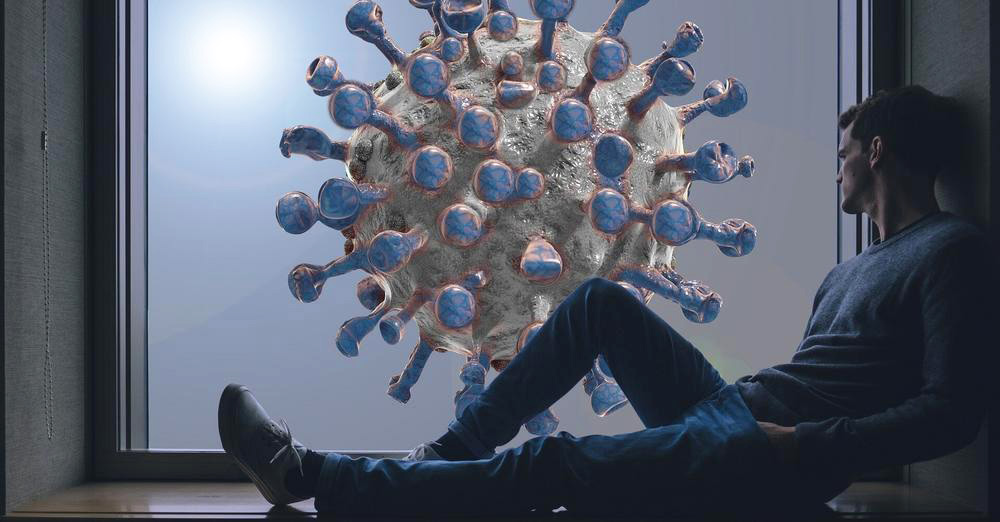

What do you see - a man happy to have climbed to the top of a pyramid or a man at the end of a pier feeling lonely and sad? I immediately saw the pyramid and was surprised when the name on the jpg read 'man on pier'. Life is about perception guided by emotions.
The human experiment is about studying emotions - loneliness being one of many that try the soul by leading to feelings of isolation and negativity in the simulation of reality where all things - for all people - are preprogrammed before they are born. The concept of free will is just part of the illusion in which we experience - in the concept of linear time which in itself is misunderstood.
There is both an internal (genetic) basis for loneliness linked to depression and other mental disorders - as well as external factors as one goes through life - forever a learning lesson in emotions and how to deal with them. Professional help and support is what will get somebody through the day if they have the energy and the desire to seek it out. As we've learned, these things are just a temporary fix, but in this crazy world, which is growing worse exponentially, options for most people are out there.
It has been proven that you can die of a 'broken heart' after great loss which is true as emotions set the stage for the physical body in more ways than one. What it basically means is a person feels no meaningful purpose to life - which can increases as one ages.
The Loneliness Curve New York Times - May 21, 2024
In an age when participation in community organizations, clubs and religious groups has declined, and more social interaction is happening online instead of in person, some young people are reporting levels of loneliness that, in past decades, were typically associated with older adults. It's one of the many reasons loneliness has become a problem at both the beginning and end of our life span.

Loneliness by definition is a feeling wherein people experience a powerful surge of emptiness and solitude. Loneliness is more than the feeling of wanting company or wanting to do something with another person. Someone who is lonely may find it hard to form human contact.
Loneliness is an unpleasant emotional response to perceived isolation. Loneliness is also described as social pain - a psychological mechanism which motivates individuals to seek social connections. It is often associated with a perceived lack of connection and intimacy. Loneliness overlaps and yet is distinct from solitude.
Solitude is simply the state of being apart from others; not everyone who experiences solitude feels lonely. As a subjective emotion, loneliness can be felt even when a person is surrounded by other people. Hence, there is a distinction between being alone and feeling lonely. Loneliness can be short term (state loneliness) or long term (chronic loneliness). In either case, it can be intense and painful.
The causes of loneliness are varied. Loneliness can be a result of genetic inheritance, cultural factors, a lack of meaningful relationships, a significant loss, an excessive reliance on passive technologies (notably the Internet in the 21st century), or a self-perpetuating mindset.
Research has shown that loneliness is found throughout society, including among people in marriages along with other strong relationships, and those with successful careers. Most people experience loneliness at some points in their lives, and some feel it often.
Loneliness is found to be the highest among younger people as, according to the BBC Loneliness Experiment, 40% people within the age group 16-24 admit to feeling lonely while the percentage of people who feel lonely above age 75 is around 27%.
The effects of loneliness are also varied. Transient loneliness (loneliness which exists for a short period of time) is related to positive effects, including an increased focus on the strength of one's relationships.
Chronic loneliness (loneliness which exists for a significant amount of time in one's life) is generally correlated with negative effects, including increased obesity, substance use disorder, risk of depression, cardiovascular disease, risk of high blood pressure, and high cholesterol.Chronic loneliness is also correlated with an increased risk of death and suicidal thoughts.
Medical treatments for loneliness include beginning therapy and taking antidepressants. Social treatments for loneliness generally include an increase in interaction with others, such as group activities (such as exercise or religious activities), re-engaging with old friends or colleagues, and becoming more connected with one's community. Other social treatments for loneliness include the ownership of pets and loneliness-designed technologies, such as meetup services or social robots (although the use of some technologies in order to combat loneliness is debated).
Loneliness has long been a theme in literature, going back to the Epic of Gilgamesh. However, academic coverage of loneliness was sparse until recent decades. In the 21st century, some academics and professionals have claimed that loneliness has become an epidemic. Read more ...
There's loneliness and then there's being alone - happy in your own energies. Everybody needs alone-time to get away from other people even if they're a positive influence.
Loneliness can to happen to anyone of any age and background - but is more often than not an emotional pattern linked with depression.
One's upbringing and genetics can also play an important role in the emotion of loneliness.
Some people can be in a room with others and still experience loneliness.
Loneliness also goes with hopelessness when you feel there is no one who cares about you.
Loneliness is often felt at the end of a relationship, or the death of someone you care about.
Can loneliness kill? Not really. But the depressive anxiety-ridden emotions that go along with it, can.
Asperger's syndrome can lead to feelings of loneliness because you're less likely to find happiness and connection in the company of others. Asperger's has been merged with other conditions into autism spectrum disorder.
Support animals are often a way to overcome loneliness.
It's all about your DNA programming in the simulation of reality.
Lonely People's Brains Work Differently, New Evidence Shows Science Alert - July 8, 2023
While non-lonely people were more or less similar neurologically speaking, individuals with high levels of loneliness, regardless of how many friends they had, were more likely to have unique brain responses. Being surrounded by people who don't see the world quite like you do increases your risk of feeling lonely, even if you're friends with them. Neuro-imaging tests on 66 young adults discovered significant contrasts in the way lonely people's brains process information compared to their peers. Not feeling understood can be a big part of why some feel disconnected from others. We're all likely to experience loneliness during our lives, an emotional state when we perceive a gap between our desired and actual relationships. Loneliness often relates more to the quality of our relationships than their quantity, and it impacts our health in multiple ways.
Global study shows loneliness can shorten life spans Medical Express - June 26, 2023
Folks who reported that they were socially isolated or felt lonely were more likely to die early from all causes including cancer, according to a sweeping review of 90 studies that included more than 2.2 million people from around the globe.
Fighting loneliness by finding purpose Medical Express - June 26, 2023
A new study offers an important message for our times: A sense of purpose in life - whether it's a high-minded quest to make a difference or a simple hobby with personal meaning - can offer potent protection against loneliness.
Loneliness is an unpleasant emotional response to perceived isolation. Loneliness is also described as social pain - a psychological mechanism which motivates individuals to seek social connections. It is often associated with a perceived lack of connection and intimacy. Loneliness overlaps and yet is distinct from solitude.
Solitude is simply the state of being apart from others; not everyone who experiences solitude feels lonely. As a subjective emotion, loneliness can be felt even when a person is surrounded by other people. Hence, there is a distinction between being alone and feeling lonely.
Loneliness can be short term (state loneliness) or long term (chronic loneliness). In either case, it can be intense and painful.
The causes of loneliness are varied. Loneliness can be a result of genetic inheritance, cultural factors, a lack of meaningful relationships, a significant loss, an excessive reliance on passive technologies (notably the Internet in the 21st century), or a self-perpetuating mindset.
Research has shown that loneliness is found throughout society, including among people in marriages along with other strong relationships, and those with successful careers.
Most people experience loneliness at some points in their lives, and some feel it often. The effects of loneliness are also varied. Transient loneliness (loneliness which exists for a short period of time) is related to positive effects, including an increased focus on the strength of one's relationships.
Chronic loneliness (loneliness which exists for a significant amount of time in one's life) is generally correlated with negative effects, including increased obesity, substance use disorder, risk of depression, cardiovascular disease, risk of high blood pressure, and high cholesterol. Chronic loneliness is also correlated with an increased risk of death and suicidal thoughts.
Medical treatments for loneliness include beginning therapy and taking antidepressants. Social treatments for loneliness generally include an increase in interaction with others, such as group activities (such as exercise or religious activities), re-engaging with old friends or colleagues, and becoming more connected with one's community. Other social treatments for loneliness include the ownership of pets and loneliness-designed technologies, such as meetup services or social robots (although the use of some technologies in order to combat loneliness is debated).
Loneliness has long been a theme in literature, going back to the Epic of Gilgamesh. However, academic coverage of loneliness was sparse until recent decades. In the 21st century, some academics and professionals have claimed that loneliness has become an epidemic though this claim has been disputed - with critics arguing that loneliness has not increased but rather only academic focus on the topic has.

If you are reading this you are a student of human emotions, perhaps an authority by now after all your life experiences and the books, DVD's, CD's and blogs you have read and listened to. You are just checking in to be sure you understand functional from dysfunctional and that there is nothing you have missed that is new in the grid. Okay ... you're good.
Friday puts many people in 'weekend mode' - for some taking a reprieve from the trials and tribulations of the economy. Social activities go to online chatting and meeting new friends, to partying, traveling, catching up with family, friends and things missed, or just relaxing. The quest to be with a partner highlights now be it for fun, sex, or something more permanent. People often feel lonely on the weekend, especially in the winter.
Loneliness was never an issue, or even a consideration for me, though for many, it goes to fear, rejection, and other negative emotions that really need analysis and medication if they become overwhelming. Loneliness in this case is a state of mind - isolation - depression - a result of being unable to cope with life and the dramas it presents.
Maybe that's why so many souls are in the healing grid - healing themselves by healing others - issues with tissues stuff.
Many people are lost and lonely even in a group of people ... or have never felt 'connected' to anyone or anything. Some believe they are not from here. Guess what?! None of us are from here ... we are just visiting and exploring the physical realms, most looking for the way out.
It's always nice to find those of like mind. It creates a natural high, a sense of connection and belonging - and most of all being understood. Your grids match - and voila you are no longer lonely.
We experience in the game of emotions. They are a tricky, often sticky business, as they overlap and entwine themselves for us ... within and without.
The end of the simulation will create a state of loneliness for everyone, no matter how many souls stick around. It is meant to show you that at the end of time, you are alone down here on a journey into awareness.

Currently humanity is in the throes of Covid-19 - causing feelings of isolation, depression, loneliness and loss for millions around the world.
Most humans are programmed to interact with others to avoid feelings of isolation and loneliness - and to test the nature of our emotionally based simulation. The premises is, we learn and grow through social interaction.
Togetherness 24/7 for some people has been a positive but not for everyone. Together under one roof - away from one's routines - may seem like a great way for people in relationships to rediscover each other - but it may have the opposite effect as life changes who we are.
Being able to interact online and by phone has alleviated some of the loneliness factor by creating new friendships and other types of relationships that may or may not continue once Covid lifts and we see what's on the other side.
It's never easy ...
Loneliness Kills, Study Shows Live Science - March 31, 2006
It's true - you might die of loneliness, but not until you're older. In a new study of men and women 50 to 68 years old, those who scored highest on measures of loneliness also had higher blood pressure. And high blood pressure is a major risk factor for heart disease, the number one killer in many industrialized nations and number two the United States.
Lonely people have blood pressure readings as much as 30 points higher than non-lonely people. Blood pressure differences between lonely and non-lonely people were smallest at age 50 and greatest among the oldest people tested.
The researchers separated loneliness out from depression, age, race, gender, weight, alcohol consumption, smoking, blood pressure medications, hostility, stress, social support and other factors.
Loneliness eats at you. The morbid health effect of loneliness accumulates gradually and faster as you get older. Loneliness was worse for blood pressure than any other psychological or social factor the researchers studied.
Weight loss and physical exercise reduce blood pressure by the same amount that loneliness increases it. About one in five Americans is lonely, a gnawing emotional state that is a patchwork of feeling unhappy, stressed out, friendless and hostile.
The main psychological difference between lonely and non-lonely people is that the former perceive stressful circumstances as threatening rather than challenging and cope passively and withdraw from stress rather than trying to solve the problem.
Lonely people who are middle-aged and older tend to also have problems with alcoholism, depression, weak immune system responses to illness, impaired sleep and suicide.
Some psychologists think that associations between loneliness and health or physiology are just part of a generic stress response, but this new research suggests loneliness has a unique impact.
Social trends in the United States suggest a recipe for greater loneliness and thus higher blood pressure and risk of heart disease. The population is aging and more people move around and live alone than ever, contributing to greater separation from caring friends and family.